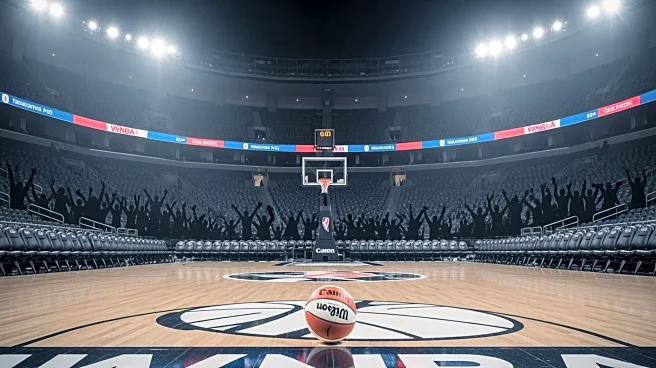What's Happening?
The Women's National Basketball Association (WNBA) has achieved a significant milestone with its 2025 playoffs, marking the most-watched postseason in the league's history. According to ESPN, the playoffs averaged
1.2 million viewers across 24 games, with the Finals alone drawing an average of 1.5 million viewers. This surge in viewership represents a five percent increase from previous seasons and follows a trend of growing popularity for the league. The WNBA has seen substantial growth over the past two seasons, including record-breaking regular season viewership, attendance, and digital engagement. The arrival of Caitlin Clark, a standout player from Iowa, has contributed to this popularity, although her limited participation due to injuries did not hinder the league's overall success. Other prominent players like A'ja Wilson and Napheesa Collier have also played a significant role in attracting audiences.
Why It's Important?
The increase in viewership and popularity of the WNBA signifies a shift in the sports landscape, highlighting the growing interest in women's sports. This trend could lead to increased investment, sponsorship, and media coverage, further elevating the league's profile. The WNBA's success also underscores the potential for women's sports to generate substantial revenue and fan engagement, challenging traditional perceptions and paving the way for greater gender equality in sports. As the league's current collective bargaining agreement (CBA) is set to expire, there is an opportunity for players to negotiate better terms, including a higher percentage of revenue sharing, which could have long-term implications for player compensation and league operations.
What's Next?
With the expiration of the current CBA on October 31, the WNBA and its Players Association are focused on negotiating a new agreement that aims to be transformational. Players are advocating for a revenue-sharing model that grows with the league's business, potentially including team revenue. The outcome of these negotiations could set a precedent for future agreements in women's sports, influencing how revenue is distributed and impacting player salaries and benefits. The league's continued growth may also lead to expansion opportunities, increased sponsorship deals, and further integration into mainstream sports media.
Beyond the Headlines
The WNBA's rising popularity could have broader cultural implications, promoting greater visibility and representation for women in sports. This shift may inspire young female athletes and contribute to changing societal attitudes towards women's sports, encouraging more inclusive and equitable practices across the industry. Additionally, the league's success could influence other women's sports organizations to adopt similar strategies for growth and engagement, fostering a more diverse and dynamic sports ecosystem.










